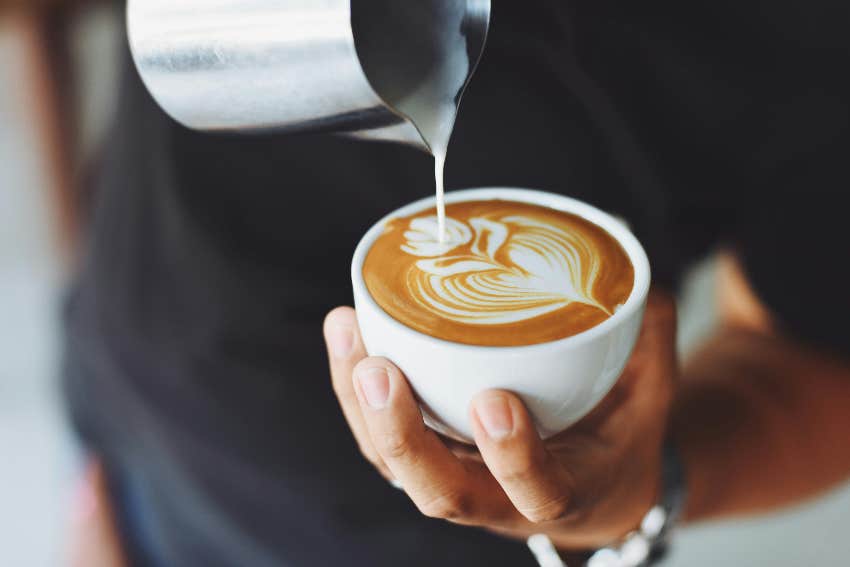What Your Coffee Order Reveals About You, According To Psychology
How different cultures appreciate coffee.
 Jacob Lund | Canva
Jacob Lund | Canva If you asked me to identify whether someone was European or American and the only clue you gave me was watching them drink coffee, I’d be pretty accurate. So would you.
Americans are people who think nothing of sitting in their cars and waiting in line at a coffee shop drive-through lane to get their morning dose of Go Juice and they’ll drink it, silent and solitary, on their way to work. It’s as if “drinking coffee” were on their list of things to do, right after “brushing their teeth” and “starting the car.” We don’t treat it like a pleasure. We treat it like a chore.
What your coffee order reveals about you, according to psychology
Europeans do not drink coffee in their cars. A lot of them don’t even use a car to get to work.
If they don't make their coffee at home, they will go to a cafe, and that is where they will enjoy their coffee. They’ll drink it from a real china cup, not from a paper or plastic one. (Much of Europe has barely any litter, and this is part of the reason why.)
Europeans will drink their coffee with friends or colleagues. They probably know the staff and regulars.
They won’t be in a huge hurry; if they didn’t have time, they would not be drinking coffee. What would be the point of rushing through coffee? That would be like rushing through the best things in life.
My husband is Dutch, and for him, drinking coffee is a ceremony. Once he has his cup, he is not to be disturbed until it is gone — and he’s going to be at it for a while.
This was a big adjustment for me. I tend to be impatient. Being impatient doesn't make time go faster, and can eventually lead to more stress, psychology tells us.
Should you have the temerity to ask my husband to do something while he’s drinking coffee, he will sigh. “Can I not just enjoy my coffee?” (You have to imagine the Dutch accent.)
When that man is drinking coffee, you could scream that the house was on fire and he would still be reluctant to put down his cup. To me, it’s no big deal. Put the coffee down for a minute, and help me do the thing I need another set of hands for, and then you can resume your coffee.
 Chevanon Photography / Pexels
Chevanon Photography / Pexels
No problem, right? You would be wrong. That would be like asking a nun to please stop praying for a few minutes because you need her to help you hang a picture.
I’ve come to appreciate what I think of as the Sacred Dutch Coffee Hour. We make our coffee at home, but when on some odd occasion I deviate from that, I have come to detest drinking coffee from a paper cup, or from any to-go container.
It ruins the aesthetics of the experience for me. I’d rather not drink any coffee at all if I cannot have it in a real cup.
I avoided ordering a cappuccino in Europe because I had in mind the awful sugary garbage I’ve been given here in the U.S. And then one day after we visited the cathedral in Aachen, Germany, we stepped into a cafe and my sister-in-law ordered a cappuccino.
It looked very different from what I was expecting, so I tried one, too. It was an entirely different drink from what I’d had in the U.S. I’d think twice before ordering a cappuccino in the U.S., but not in Europe.
It isn’t just coffee. Meals are the same way. A meal lasts much longer in Europe than it does in the U.S.
It used to be routine for me to eat lunch at my desk at work. In France, that’s actually illegal now! Lord have mercy — I'd be serving a life sentence over there.
If anything, we in America are more likely to require you to eat your lunch at your desk. You there, keep working! You can chew while you’re typing!
Americans are all about work-work-work. You drink your coffee on your way to work. You eat your lunch at your desk. For dinner, you might drive through and get fast food on your way home or heat up a frozen dinner.
While you’re eating it, you can brag about how many hours you put in and how hard you’re working. Anything less is deemed “quiet quitting.” And yet, a lot of that work is for show.
 Los Muertos Crew / Pexels
Los Muertos Crew / Pexels
My husband was shocked when he got his first American job. He thought the American work ethic was terrible. The people he’d worked with in Europe worked quite hard while on the clock, but they worked far fewer hours and then they enjoyed themselves at home.
They get just as much or more work done in fewer hours per week because nobody is productive when they’re tired and stressed. Americans are proud to be overworked. I think it makes us feel important.
We just love to explain, as we finish the last bit of the bad drive-through coffee in a paper cup, how incredibly hard and overworked we are. We think we are indispensable. A lot of us are eventually laid off and find out all that extra work we were killing ourselves to do was completely unnecessary and completely unappreciated.
We’d have been better off spending some of those hours with our friends and family. My kids aren’t ever going to fire me.
Coffee isn’t just a beverage — it’s a way of life. It’s a part of our identity. Ever notice how many of us on here actually mention coffee in our bios? And the way of life coffee represents in America is to work harder, work faster, eat on the run, and never sleep.
Even when Americans do go to a coffee shop, how often are they socializing with friends and how often are they working on a laptop? In other parts of the world, enjoying coffee is more about taking a moment out of your day. It might be getting a touch of the sun while sitting outdoors at a cafe.
It’s about connecting to the people you are with. It’s about having time out from work, chores, and responsibilities. It doesn’t hurt your productivity, and it helps lower your stress. Humans, as psychology states, are social creatures after all, and connecting with others is what we're amde to do.
Honestly, which sounds better to you? Luckily, there are no laws prohibiting Americans from slowing down and enjoying their coffee — yet.
Michelle Teheux is a freelance writer, journalist, and former newspaper editor who writes about her experiences abroad.

